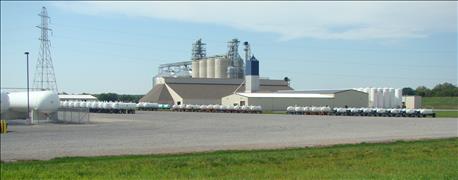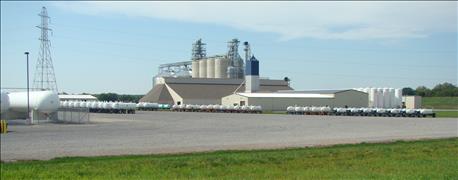November 11, 2016

Adjacent to the new TruHorizons elevator near Milford is the company’s agronomy center. Although the two components work hand in hand to provide planting-to-harvest solutions to its customers, the agronomy center is somewhat the senior partner, having opened its doors in the spring of 2014.
And while the elevator leans on Cargill’s strengths in grain markets and marketing, the agronomy center draws heavily on Sunrise Cooperative’s expertise in all things agronomic. The center is a full agronomy retail plant, offering a complete line of services: crop nutrients, crop protection products, seeds and traits, crop scouting, precision agriculture, custom application services, and more.

AGRONOMY IN ACTION: This new facility near Milford was designed to supply clients' input needs in TruHorizons’ regional marketing area.
Local yet global
The agronomy center’s operations manager, Chase Snyder, says the goal of the agronomy facility is to give area growers the best of both worlds. “We’ve got state-of-the-art buildings and custom application equipment, have an excellent team, and are leveraging the synergies that come with working next door to our grain facility.
“We want to offer growers all of the technology and modern advances available today. But while we’re supported by large companies on the back end, we’re managed right out of this location. We want to give our customers that small-town, right-down-the-road elevator and cooperative feel, but with resources that you wouldn’t be able to get anywhere else.”
One synergy that comes from being partners with the grain complex is the location next to two key railroads. The trains run in both directions. In other words, the same unit trains that speed corn, soybeans and wheat from the elevator to whichever market is the hottest do the same thing with low-priced inputs coming into the agronomy center from the other direction. One area farmer on the edge of TruHorizon’s targeted 60-mile radius says that approach is working for him.
“Their input prices have been really competitive,” says Dan Dale, Wabash. “I subscribe to a database service that tracks a number of different factors so that I can see how my operation stacks up against others. It showed that my chemical prices were below the norm, and I’m pretty happy with that. I’m not really a large farmer, but it’s nice to know that I’m in the ballpark of what larger farmers are paying.”
One-stop shopping
Snyder says the two facilities working next door to each other and leveraging each other’s expertise is essentially the whole idea — to make TruHorizons a literal “one-stop shop,” where customers can work with an agronomist to figure out a program for raising their crops, and then walk down the hall a few doors to a marketing expert who can help them figure out the best way to sell it. Again, Dale says the approach works for his operation.
“They have a marketing program that lets me set a price on my grain in the fall, but also fixes me up with a call option so I can participate in any rally that takes place later,” he says. “But then it goes a step farther. I can then trade bushels of grain for special deals and early payment discounts on inputs. I really like that, because then I don’t have to go back to my banker and ask for more money.”
Boone writes from Wabash.
You May Also Like




